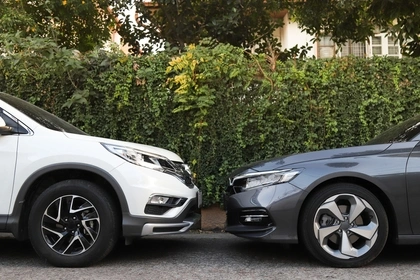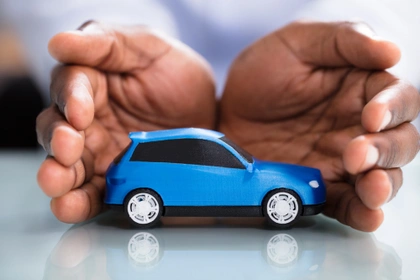How does PCP work?
PCP car deals are made up of three parts: your deposit, the amount you borrow, and the optional balloon payment at the end. They can be used to finance new and used cars, and they usually last between two and four years. Terms and conditions will apply. You’ll need to agree to a set annual mileage and commit to keeping the car in good condition to avoid facing extra charges when your loan term comes to an end.
At the end of your agreement, you can choose to:
1. return the car
2. take ownership of it by paying the optional one-off balloon payment
3. or use any positive equity towards buying a new car. (Equity is the difference between the car’s value and the outstanding car finance balance).
You should be aware that the finance is secured against the car, which means if you fall behind with repayments, it could be sold by the lender to recoup the money they’ve lost.
1. Deposit
While some lenders can offer no-deposit car finance, many PCP car finance deals require a deposit. If you choose not to put down any money upfront, you’ll need to borrow a higher amount. This means you’ll probably need a good credit score to offset the increased risk to the lender and you may face higher monthly repayments. The typical PCP deposit is around 10% of the vehicle’s total value.
Here at Ocean, we have access to zero-deposit options, depending on your individual circumstances.
2. Amount to borrow
When comparing PCP to HP, one of the biggest differences is that monthly PCP payments don’t cover the full cost of the car – whereas HP agreements do. This means your monthly repayments are likely to be lower with PCP.
Your PCP loan will only cover the difference between the car’s purchase price (minus any deposit) and the Guaranteed Minimum Future Value (GMFV). The GMFV is the value that the car finance company guarantees your vehicle will be worth at the end of your agreement.
3. Balloon Payment
The final part of a PCP agreement is the balloon payment. This is the remaining balance owed at the end of your agreement. You will have the option to pay this if you want to become the legal owner of the car. The balloon payment can range from a few hundred to several thousand pounds.
A refinancing loan could help to spread the cost of the balloon payment if you wish to keep the car but can’t afford to make a lump sum payment. Bear in mind that this will likely mean you pay more interest overall.
Remember, the balloon payment is optional, and you can always decide to return the car when your agreement ends. Or you could use any equity to part exchange it and get a new vehicle.
How to reduce your monthly PCP car finance payments
PCP monthly repayments are usually lower than they would be with HP car finance because you don’t have to borrow or repay the car’s full value. Even so, there are steps you could take to reduce your PCP car finance payments even further:
Choose a car that holds its value
Depreciation affects certain vehicles in different ways, and there are some car types that hold their value better than others. Newer cars tend to lose value quickly, while models made by trusted manufacturers can have an enduring appeal.
Put down a large deposit
There’s no need to put down an amount that will completely wipe out your savings, but if you can afford to put down a larger deposit, this will reduce the amount you need to borrow and the total interest payable.
Choose a longer loan period
While you’ll pay more interest over a longer loan term, having more time to pay the loan back will allow you to split the cost into smaller monthly repayments. So, you have to weigh up the pros and cons.
Agree to a low mileage limit
If you usually drive short distances and don’t need a PCP contract with a high mileage limit, this may help to reduce your monthly repayments and slow down the rate of depreciation over your loan term. However, if you exceed the limits, you will probably face excess mileage charges.
Improve your credit score
While your credit score isn’t the only factor that lenders will consider when assessing your car finance application, it can help you to secure a lower APR (annual percentage rate). The lower your APR, the less interest you’ll pay over the loan term.
What are the advantages and disadvantages of PCP car finance?
Here are some of the main pros and cons to help you make up your mind as to whether PCP car finance could be suitable for your individual needs and circumstances:
Pros
- You might have lower monthly repayments than you would with other car finance options
- You have options at the end of your agreement
- You may be able to afford a better or newer car than you thought
- You can change cars regularly and simply hand the old one back to the lender at the end of your deal
Cons
- You won’t own the car at the end of the term unless you choose to pay the one-off balloon payment
- You’ll face additional charges if you exceed the mileage limit or damage the car beyond standard wear and tear
- You could end up in negative equity if the value of your car at the end of your agreement is not enough to cover the remaining balance
- You could lose the car if you don’t keep up with the repayments
Should I choose a PCP or HP car finance agreement?
The right type of car finance agreement for you will depend on your personal circumstances. There’s no one-size-fits-all approach. If you’re comparing personal contract purchase vs hire purchase, there are a few things you should consider.
PCP car deals will often offer lower monthly repayments than HP, and as you don’t need to borrow the car’s full value, you might be able to buy a newer or higher spec car for less. You can also choose to return the car when you reach the end of your agreement or use any positive equity to secure a new deal (if it’s worth more than you owe).
If car ownership is important to you, other options may be preferable, as you could be working towards owning the vehicle and may not have to consider covering a balloon payment in the future.
Read on to find out more about the pros and cons of PCP and HP agreements.
What do I need to be eligible for PCP finance?
As different lenders have different eligibility criteria, we can’t guarantee that you’ll be accepted for a PCP contract, but there are certain things that you’ll usually need to provide during your application.
To be eligible for PCP car finance:
- You’ll need to pass a credit check to assess what kind of borrower you’ll be – this will usually be a soft search unless you choose to proceed with a car finance application in which case it’ll be a hard search (as with any type of credit)
- You’ll need to pass an affordability check to identify whether you’ll be able to keep up with your monthly repayments throughout the loan term
- You must be aged 18 or over
You’ll also likely need to supply the following details:
- Your name and date of birth
- Most lenders require three years’ proof of address history in the UK
- Your employment details, including your current job title and salary
- Your bank details and proof of income, such as payslips or bank statements
- A full UK driving licence
- Proof of ID, such as a passport
Other car finance options
If you feel that PCP car finance isn’t the right choice for you, there are several other car loan options to consider:
- HP car finance is like PCP in many ways, as it’s also a loan that’s secured against the car, but you’re working towards vehicle ownership. As a result, the monthly repayments are likely to be higher than with PCP. Loan terms typically last between one and five years. Once you’ve finished making payments, the car will be yours.
- PCH or car leasing is a form of long-term car rental that is often only available on new cars. You’ll have to make monthly payments, agree to a set mileage, and keep the car in good condition, but when you reach the end of your agreement, you simply hand the car back with nothing else to pay. The repayments tend to be lower than with other types of car finance, but there isn’t the option to buy the car or part exchange it at the end.
- A personal loan is an unsecured loan that you can use to buy a car. You’ll make monthly repayments, but as soon as you’ve used the loan to purchase the car, it will be yours and you’ll be registered as the legal owner. The loan isn’t tied to your car, so you can do whatever you like with your vehicle, including modifying or selling it before you finish paying it off.
Get car finance up to £100,000
- Check your eligibility without impacting your credit score
- No deposit needed
- Rates from 8.9%* APR
'Representative Example: Borrow £12,000 over 5 years with a £0 deposit. Representative 20.5% APR fixed rate. Monthly payment: £309.93. Option to purchase fee £10 payable. Total cost of credit: £6,605.80. Total amount repayable: £18,605.80.
We are a credit broker, not a lender. We partner with CarFinance 247 Limited, a credit broker (not a lender) who works with a wide panel of lenders.
Disclaimer: We make every effort to ensure content is correct when published. Information on this website doesn't constitute financial advice, and we aren't responsible for the content of any external sites.






